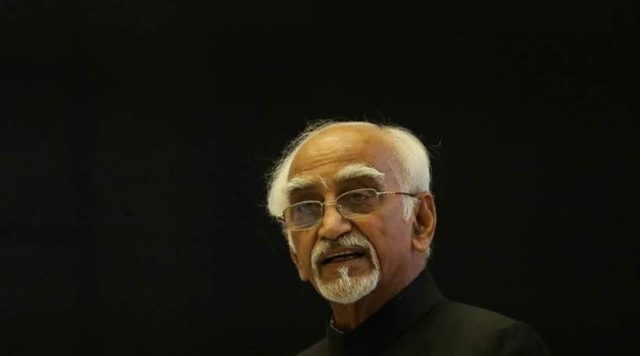
By Dr Rakesh Sinha
The last Vice President of India Hamid Ansari’s observation just before he demitted office that “more recently, an alternative view point of purifying exclusivism has tended to intrude into and take over the political and cultural landscape” is an unconcealed attack on the ideological moorings of the RSS and the Narendra Modi government. However, it is nothing more than another unreasonably polemical expression of anti-RSSism as it remains unsubstantiated by evidence of discriminatory practices.
The RSS is not a new entity whose ideological tenets are unknown nor has the BJP assumed power in the country for the first time in 2014. Its predecessor, the Bharatiya Jana Sangh (BJS), was instrumental in the formation of non -Congress governments in half a dozen provinces along with Ram Manohar Lohia’s socialists and also the Communist Party of India (CPI) in 1967. The the CPI justified camaraderie with the BJS “not as a sop” but based on “concrete programmes”. Since then, the political trajectory of the party includes coalition experiences with parties which have been ideologically opposed to it. From 2014 onwards, there has been a marked consolidation of saffron politics as India’s political executive is completely Congress-mukt — the offices of president, vice president and prime minister are held by RSS men.
The RSS is an ideologically driven movement which is more subaltern than any other group or idea. It believes that the masses, not disconnected elites, can change the destiny of a people. More than 1,60,000 social projects to empower the poor and marginalised are being run by RSS workers, including in Naxal and insurgency affected areas, without soliciting the support of big business or government. India’s biggest chain of schools run by Vidya Bharati belongs to the RSS. This is a small part of the social concern embedded in the ideological indoctrination of cultural nationalism which, according to Ansari, is an “illiberal form of nationalism” which promotes “intolerance and an arrogant patriotism”. This is a reactionary attack on the idea which has been the basis of India’s unity and the continuity of its civilisation. Ansari’s idea unveils his own perspective of the nation and nationalism, nurtured by Western narratives.
Sukumar Dutt understood the crisis of Indian intellectuals as early as 1926 when he aptly argued in Problem of Indian Nationality that “a mind free from (the) Western concept of nationality is absolutely necessary to comprehend the problems of Indian nationality.” The Western mind, averse to conflicts and with binaries of religion, language and cultures, defines nationalism as political and considers constitutionalism the guarantee for its perpetuation.
However this is not the case in India. The concept of nationalism can be traced from the prithvi sukt of the Atharva Veda which proclaims “the earth is our mother and we are her sons (mata bhoomi putroham prithivyah).” That is the reason humanitarian concern is embedded in India’s cultural nationalism and “otherness” is largely missing from its narratives. That is the reason cultural nationalism becomes a cradle for extremes and is classically accommodative. Ansari misses the spirit and message of the constituent assembly debate on secularism which is no different than the RSS’s perspective on secularism and nationalism. It is worth recalling the words of two members of the Constituent Assembly, Tajamul Hussain of Bihar, and H.C. Mukherjee, vice chairman of the assembly and a practising Christian.
Hussain said the concept of minority was incompatible in the Indian case as India’s history showed there had never been a tyranny of the majority. Mukherjee, on the other hand, warned the nation that acknowledging any community as a minority on the basis of religion would be detrimental to the objective of One People One Nation.
But post-Independence, India’s politics undermined the noble doctrine of One People One Nation and increasingly relied on Western definitions and experiences. Secularism and nationalism cannot be safeguarded only by enjoying privileges in the name of pluralism but not contributing to strengthening the idea of modernity and multiculturalism. It was intolerance toward Hindus when they faced demographic aggression by Semitic religions as part of the latter’s expansionism. Cultural nationalism is based on spiritual democracy which promotes pluralism, not obstructs it.
Cultural nationalism as an ideology had votaries even before the formation of the RSS — Aurobindo Ghose, B.C. Pal, Bal Gangadhar Tilak, Lajpat Rai and many others. It reconnects modern India with its progressive ancient past and cultural and intellectual legacies. This idea was raised by Jawaharlal Nehru at the convocation at Aligarh Muslim University on January 24, 1948: “I have said that I am proud of our inheritance and our ancestors who gave an intellectual and cultural pre-eminence to India. How do you feel about this past? Do you feel that you are also sharers in it and inheritors of it and, therefore, proud of something that belongs to you as much as to me? Or do you feel alien to it and pass it by without understanding it or feeling that strange thrill which comes from the realisation that we are the trustees and inheritors of this vast treasure?”
But post-Independence India’s Muslim intellectuals escape this question and consider the role of people like Tajamul Hussain in the Assembly “as subversive to minority’s rights”. Hamid Ansari is a prisoner of the binary of majority and minority, which he assumes is essential to secularism and the RSS considers the binary an insult to the historical tradition of the nation. To quote Carlton Hayes “a nationality receives its impress, its character, its individuality from cultural and historical forces.” Ansari, by calling cultural nationalism illiberal, devalued the personality of the nation acquired over thousands of years.
Courtesy: The Indian Express














